- Globe University, formerly known as Globe College, has provided career training since the 19th century. As a student at Globe University, you will learn practical skills; as a graduate, you will be ready for employment. Degree programs at Globe University-Minneapolis are designed to provide graduates with the tools they need to start and sustain rewarding careers. Whether students are recent high school graduates, working adults or international students, they will be prepared for success in their chosen areas.
School Highlights
Globe University-Minneapolis serves 164 students (62% of students are full-time).
The college's student:teacher ratio of 27:1 is higher than the state community college average of 22:1.
Minority enrollment is 70% of the student body (majority Black and Hispanic), which is more than the state average of 42%.
Quick Stats (2025)
- Enrollment: 164 students
- Private-state tuition: $13,440
- Student:teacher ratio: 27:1
- Minority enrollment: 70%
- Source: Integrated Postsecondary Education Data System (IPEDS)
Top Rankings
Globe University-Minneapolis ranks among the top 20% of public schools in Minnesota for:
Category
Attribute
Diversity
School Resources
School Overview
The teacher population of 6 teachers has stayed relatively flat over five years.
Globe University-Minneapolis
(MN) Community College Avg.
Carnegie Classification
Item not available
Associate's Colleges: Mixed Transfer/Career & Technical-Mixed Traditional/Nontraditional
Institution Level
Less than 2 yrs
At least 2 but less than 4 years
Institution Control
Private, for profit
Public
Total Faculty
6 staff
153 staff
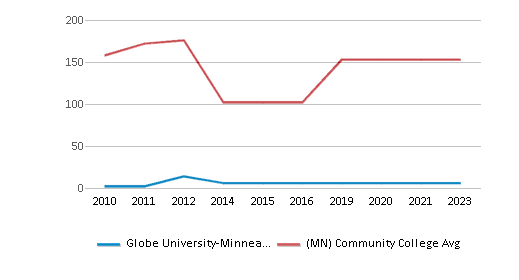
Student Body
The student population of Globe University-Minneapolis has stayed relatively flat over five years.
The student:teacher ratio of 27:1 has stayed the same over five years.
The Globe University-Minneapolis diversity score of 0.89 is more than the state average of 0.63. The school's diversity has grown by 17% over five years.
Total Enrollment
164 students
2,555 students
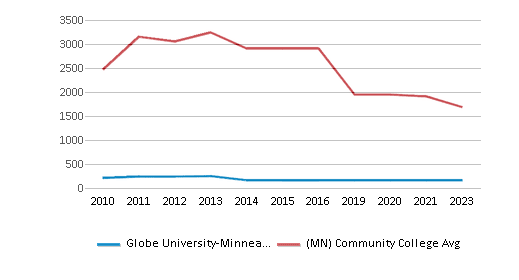
Student : Teacher Ratio
27:1
22:1
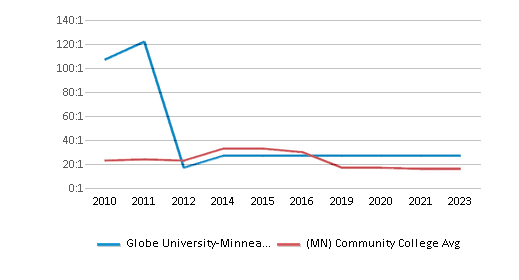
# Full-Time Students
101 students
915 students
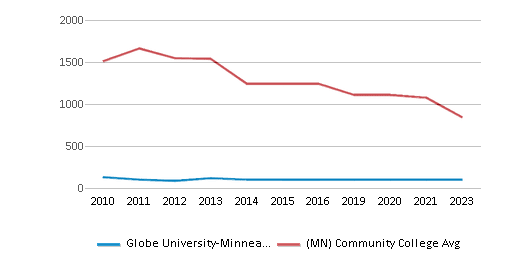
# Part-Time Students
63 students
1,808 students
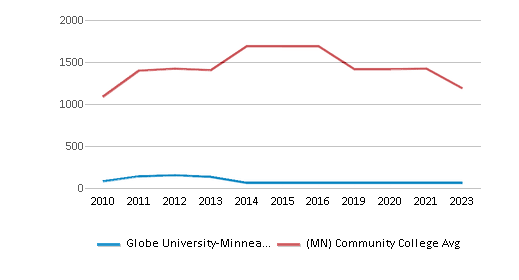
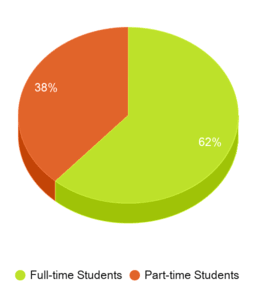
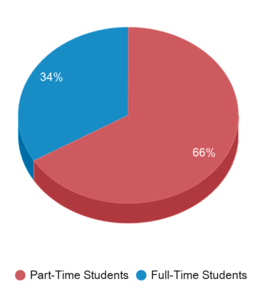
# Enrollment Undergraduate
109 students
372 students
# Full-Time Undergraduate Students
37 students
842 students
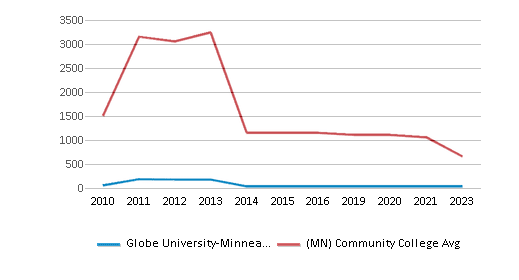
# Full-Time Graduate Students
64 students
38 students
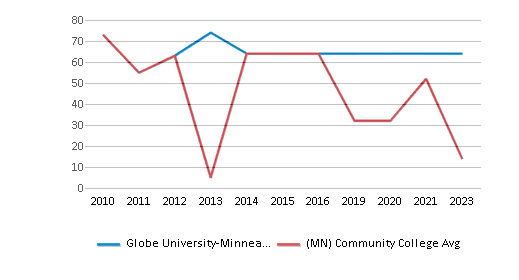
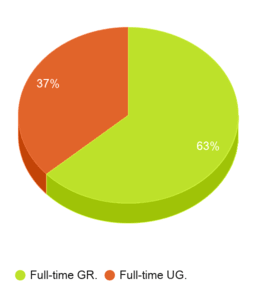
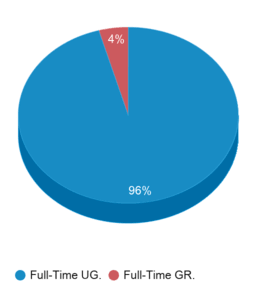
# Part-Time Undergraduate Students
n/a
1,771 students
# Part-Time Graduate Students
n/a
12 students
Total Dormitory Capacity
n/a
116 students
% American Indian/Alaskan
4%
1%
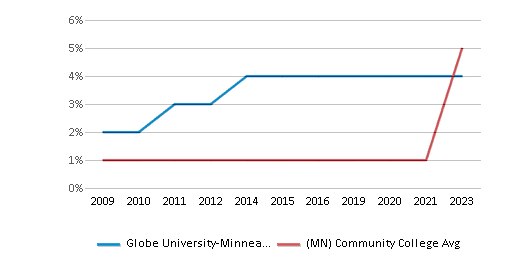
% Asian
5%
6%
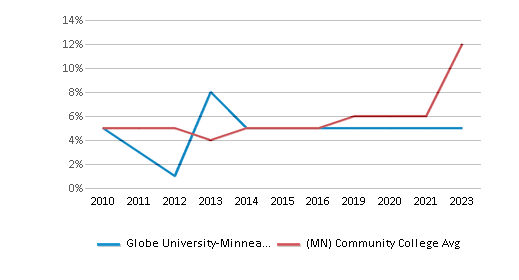
% Hispanic
7%
8%
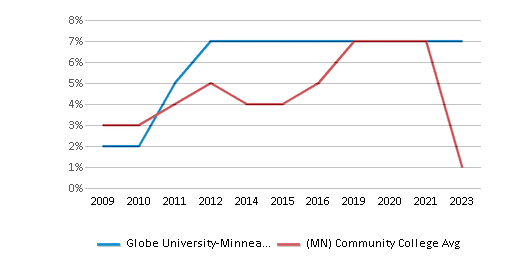
% Black
8%
15%
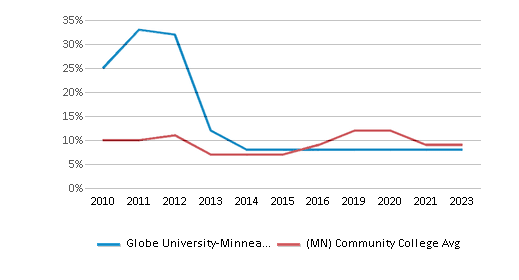
% White
30%
58%
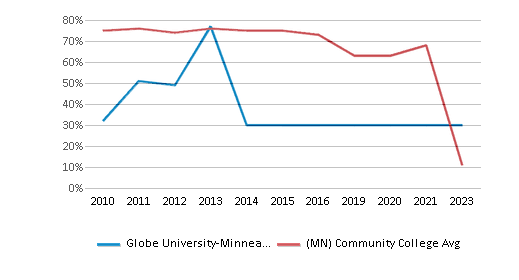
% Hawaiian
n/a
1%
% Two or more races
1%
4%
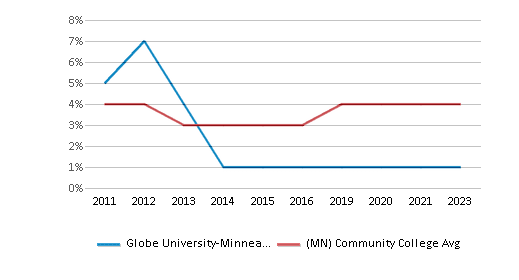
% Non Resident races
36%
1%
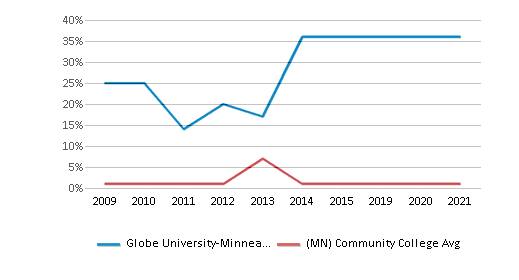
% Unknown races
8%
6%
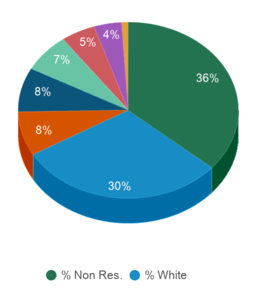
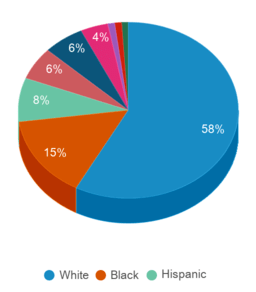
Diversity Score
0.89
0.63
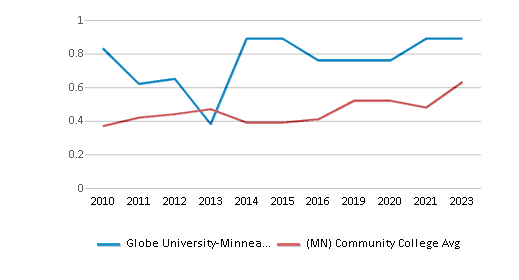
College Completion Rate (Students who graduate in less than 4 years)
n/a
0.3421%
College Completion Rate (Students who graduate in 4 years or more than 4 years)
n/a
0.5652%
Average Graduate Earnings (10 Years)
$31,500
$36,900
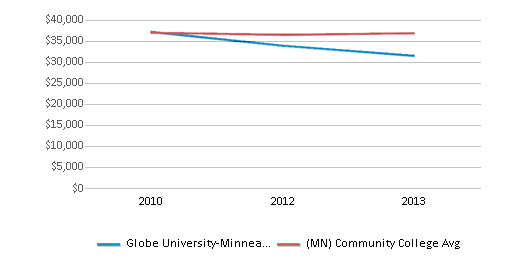
Tuition and Acceptance Rate
The private state tuition of $13,440 is less than the state average of $17,208. The private state tuition has declined by 14% over four years.
Private State Tuition Fees
$13,440
$17,208
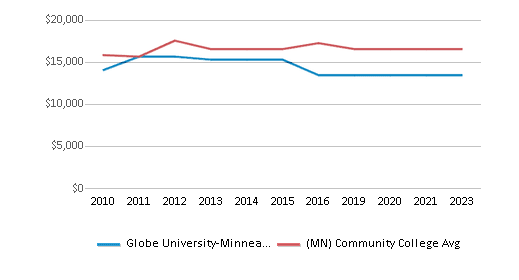
% Students Receiving Some Financial Aid
100%
89%
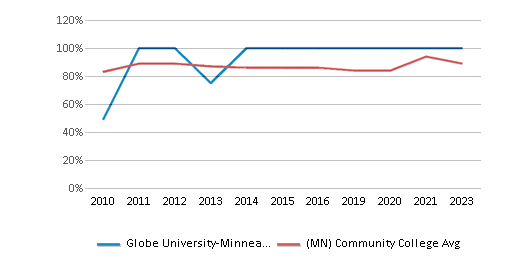
Median Debt for Graduates
$25,555
$13,775
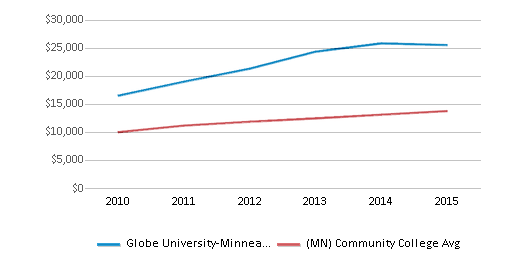
Median Debt for Dropouts
$7,500
$7,253
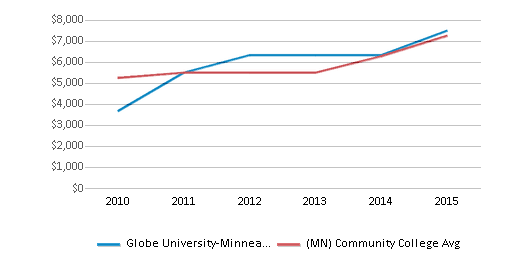
Acceptance Rate
n/a
94%
SAT Reading
n/a
625
SAT Math
n/a
600
SAT Writing
n/a
565
ACT Composite
n/a
24
ACT English
n/a
24
ACT Math
n/a
23
ACT Writing
n/a
8
Source: 2023 (or latest year available) Integrated Postsecondary Education Data System (IPEDS) , School Administrators
Frequently Asked Questions
How much does Globe University-Minneapolis cost?
Globe University-Minneapolis's private state tuition is approximately $13,440.
What is Globe University-Minneapolis's ranking?
Globe University-Minneapolis ranks among the top 20% of community college in Minnesota for: Diversity in US community colleges, Average community college minority breakdown and Percent of students receiving financial aid.
In what neighborhood is Globe University-Minneapolis located?
Globe University-Minneapolis is located in the Central Minneapolis neighborhood of Minneapolis, MN. There are 1 other community '.college.' located in Central Minneapolis.
Recent Articles

Obtaining Your Bachelor's Degree at a Community College
Explore the evolving landscape of community colleges offering bachelor's degrees, addressing affordability, accessibility, and workforce needs.

A to Z of Community College Certificates and Courses
From business and healthcare to technology and skilled trades, the article showcases the breadth of options available to students seeking to enhance their knowledge, develop new skills, or pursue career advancement.

What is a Community College?
This comprehensive guide explains what a community college is, its history, and its role in higher education. It covers the types of programs offered, differences from four-year colleges, benefits of attending, and important considerations for prospective students, providing valuable insights for those exploring educational options.








